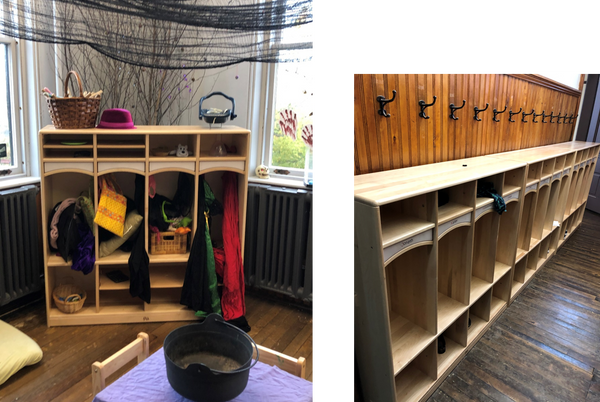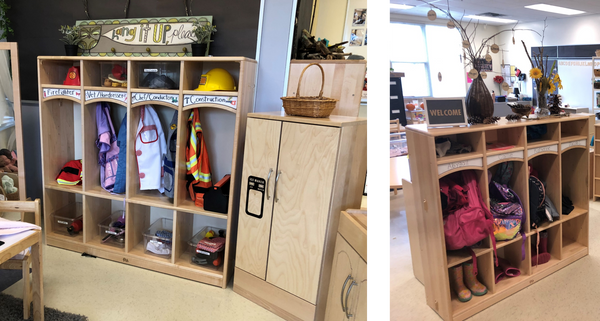Menu
In a recent trip to pre-primary classrooms in Nova Scotia we saw how a piece of furniture as ubiquitous, essential and seemingly specific as a cubby can actually fulfill multiple roles in an early year’s classroom.
In the province of Nova Scotia's recent implementation of pre-primary education, they sourced an array of quality, hardwood constructed furnishings and instructional materials for each classroom.
But every classroom space is unique. They vary from historic buildings like the Lunenberg Academy, opened in 1895, (that may or may not have ghosts residing in the basement… check out this recent CTV Atlantic News story to learn more), to schools built in this century.

So although each classroom was resourced in essentially the same way, how individual educators chose to use those furnishings were specific to that location.
An interesting trend that emerged was how often the cubbies – the Pre-school Cubbies from Community Playthings to be precise -- were used as a key part of dramatic play learning areas.
Using the cubbies for both the entry and the dramatic play area, important self-regulation skills are reinforced (see pictures above and below). An example of the Reggio Emilia approach in action, turning a classroom environment into the third teacher.
Labelling and signage prompts the children to keep things tidy and organized. Using the same storage method for entry and dramatic play reinforces those important self-regulating skills across learning areas, throughout the day.
The labelled spaces, configurable storage at multi-levels, and super durable hardwood construction of these cubbies supported by a lifetime warranty makes this sort of versatility possible and practical.
Something as humble as a cubby that can stand up to the salt and mud from winter boots can also be the centrepiece of all day learning. And as needs change, they can be moved from one area to another for different roles.
Imagine how much the needs of your education community has changed in the past 10 years. Now try to think ahead 10, 15 or more years because these cubbies are warrantied for a lifetime. The age mix of your classroom's children, the type of programming they're engaged in, even the weather and therefore the clothes children take to school will affect how you use cubbies purchased years before.
But moving a piece of furniture is extremely stressful to joints and materials. If not meticulously built, every move can dramatically reduce lifespan dramatically. Using mortise and tenon joints, maple hardwood, and an infrared bonded finish that -- like their adhesives -- are BPA and PVC free, Community Plaything furnishings have the durability to be positioned against walls or stand freely and be moved over and over again.
Plus the design means built-in versatility for service in different learning areas.
These cubbies are not inexpensive pieces.
But when considering their potential length of service, (we know of many examples of Community Playthings furniture still going strong into their 3rd decade in the classroom!) and how they can adapt to changing needs, it is understandable why a province wide program would chose to make that investment.

Request your NEW 2026 Louise Kool Early Years catalogue, with new products and expanded categories!

Let us help you realize an inspiring learning environment with unmatched expertise and service.

We are here to help. From Budgeting to Room and Centre Planning we have the answers you're looking for.

If you have a questions regarding existing orders or quotes don't hesitate to contact us.
1-800-268-4011
service@louisekool.com

© 2026, Louise Kool & Galt Powered by Shopify


